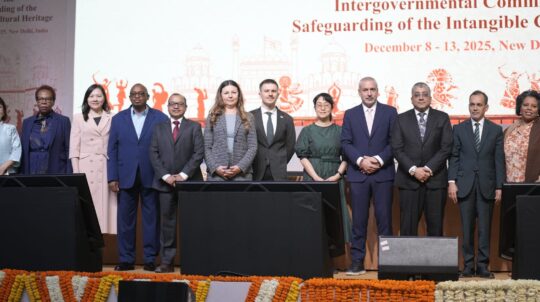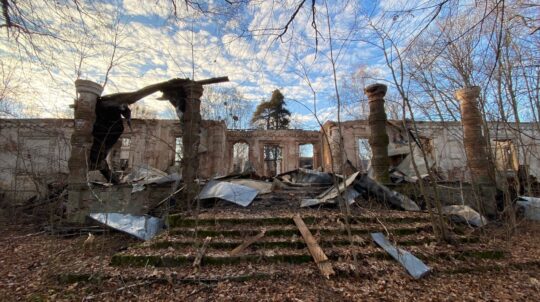On April 22, at the invitation of Oleksandr Tkachenko, Minister of Culture and Information Policy of Ukraine, Piotr Gliński, Vice-Prime Minister, Minister of Culture and National Heritage of the Republic of Poland, and Simonas Kairys, Minister of Culture of the Republic of Lithuania, visited Ukraine. The purpose of their visit is to support Ukraine in countering the aggression of the russian federation on the cultural and information fronts.
.jpg)
«Lithuania and Poland are great friends of Ukraine, who were the first to come to the rescue. We felt this in disorder and disaster caused by russian aggression on our land. The war does not make Ukraine weak. On the contrary it becomes only stronger. We plan to expand the boundaries of cooperation between the countries of the Lublin Triangle. The russian occupation forces are not only destroying everything in Ukraine, they are threatening the whole Europe. Today, Ukraine is in the forefront of both military and value confrontation. Only thanks to the consolidation of the partners’ efforts will we be able to resist the aggressor on all fronts», – said Oleksandr Tkachenko, Minister of Culture and Information Policy of Ukraine.
During the visit of the Lublin Triangle counties expressed their unconditional solidarity with Ukraine by signing a relevent statement concerning this.

Piotr Gliński, Vice Prime Minister, Minister of Culture and National Heritage of the Republic of Poland said: «Today we are in Kyiv to demonstrate our full support for Ukraine, to show that «solidarity» is not an empty word. We were supposed to meet here on February 25th – and we are meeting almost two months later, two months of the struggle of the heroic defenders of Ukraine against the brutal, ruthless invaders. We, Poles, Lithuanians, Ukrainians, the people of the heart of Europe, know very well, due to our difficult past, the modus operandi of the Russian Federation, heir to the Soviet Union and Tsarist Russia. This experience makes us stand together here – because today Ukraine is fighting for its own, but also for our freedom, for our basic values. There is no place for an illusion of symmetry or nuance in this war. That is why we are here today – to constantly remind and show the world that there has been a war in Ukraine, that innocent people are dying, and that the culture, which is an integral, inseparable part of the European heritage, is being destroyed. We want to support Ukraine on all fronts, also in the field of culture. I strongly believe that the entire civilized world is on the side of Ukraine, I believe that the Ukrainians will achieve the final victory. Nowadays, like never before, we have a chance to reconcile and strengthen our mutual relations. Two months ago we remotely signed a declaration of cooperation in the field of culture and historical heritage. Today we are here to confirm our will to develop cooperation within the Lublin Triangle in the field of culture».
Simonas Kairys, Minister of Culture of the Republic of Lithuania added: «Yesterday we heard the news that there will be no session of the UNESCO World Heritage Committee in Kazan. The Saint Sophia Cathedral, which we visited today, is a symbol of the history and statehood of Ukraine, a grand and culturally rich country. We would like to once again emphasise the absurdity of the situation in which Russia is still the chair of the UNESCO World Heritage Committee, whose aim is to preserve, not to destroy.
I strongly believe that, together with Ukraine and Poland, we will develop cooperation in the Lublin Triangle format. Firstly, both Lithuania and Poland actively support Ukraine’s integration into the European Union. Ukraine already is a part of Europe which is defending our values with weapons and the blood of its citizens. To us, the ministers of culture, it is highly important to speak about the war in the information sphere as well. We must even more actively strive for Russian and Belarussian TV channels to be blocked in the EU territory and solve other matters related to the fight with disinformation. The enemy is always trying to poison our thoughts, our thinking, and then he comes armed».
.jpg)
Thus, during the joint meeting the Ministry of Culture and Information Policy of Ukraine, the Ministry of Culture of the Republic of Lithuania and the Ministry of Culture and National Heritage of the Republic of Poland discussed urgent issues concerning:
- Establishment of a joint working group to restore Ukrainian cultural heritage.
- The need to impose sanctions against individuals and legal entities that support russian military aggression against Ukraine and continue to spread disinformation about the war in Ukraine.
- Provision of financial support for Ukrainian broadcasters of the national marathon.
- Provision of Ukraine with TV and radio equipment that will help restore the TV infrastructure damaged by russian troops in some areas.
- Implementation of cultural projects aimed at supporting the temporarily displaced Ukrainian population (refugees), including initiatives for cultural cooperation between artists and cultural figures, provision of books, etc.
It should be reminded that joint events and cooperation were planned between the countries of the Lublin Triangle before the full-scale russian invasion of Ukraine. It is a diplomatic initiative that unites Ukraine, Lithuania and Poland. Within this format, Warsaw, Vilnius and Kyiv cooperate in the political, economic, social and cultural spheres. In particular, on February 28, the Ministers of Culture of the Lublin Triangle signed an online declaration of intent to develop cultural routes Ukraine-Poland-Lithuania.


